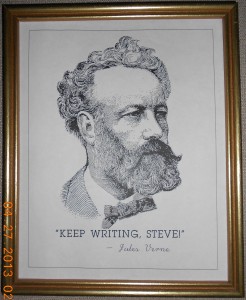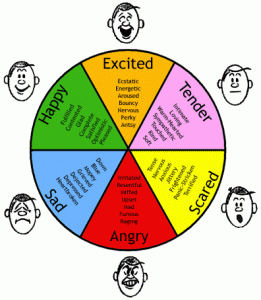Often just the sight of some object can motivate writers to put butt to chair and fingers to keyboard, even when they feel like doing something else. Do you have such an object?
 I do. A couple of decades ago, I put this framed picture of Jules Verne directly above the computer in my den. The text states, “Keep writing, Steve!” – Jules Verne. I’m not sure what prompted me to do that, and the whole thing may seem silly, but there’s just something about it…
I do. A couple of decades ago, I put this framed picture of Jules Verne directly above the computer in my den. The text states, “Keep writing, Steve!” – Jules Verne. I’m not sure what prompted me to do that, and the whole thing may seem silly, but there’s just something about it…
After all, musicians have long placed a bust of Beethoven atop their piano, and from that perch he gazes sternly as if passing judgment on the pianist’s skill. I have suggested that some enterprising person could make and sell small figurines of some of the muses as inspiration for their various creative talents. If offered inexpensively, such figurines might sell well.
But let me get back to my picture of Jules. It seems ridiculous, but the notion that my literary idol might communicate to me from the grave, urging me to keep writing, is something I find encouraging. It’s as if he’s allowing me to tap into his dedication and maybe a sliver of his talent. JV is assuring me that if I keep at it, I’ll improve. Moreover, when I’m not writing, I feel guilty for letting him down.
Half of you are now wondering if you’re reading the blog entry of a lunatic. The other half is questioning whether this really worked for me, and I’ll respond to that second half. When I first hung the picture on the wall many years ago, I think it worked well to instill the daily habit of writing. I’d be playing some computer game, would glance up and realize Jules Verne himself had commanded me to write. So I’d click out of the game and write.
In other words, yes, that very personalized object did serve to motivate me. These days, with the daily habit of writing well formed, and with several of my stories published, I’m not sure I need the framed picture any more. But Verne still stares from my wall, and will do so until I can write no more; I can’t imagine taking it down.
I’d welcome your comments on this idea. Would a motivational object work for you? Do you already have one? I suppose I’d even take comments about my sanity from the half of you with strong feelings on that subject. In the meantime, I’ll resume work on my next story; after all, Jules Verne himself has given an order to—
Poseidon’s Scribe




